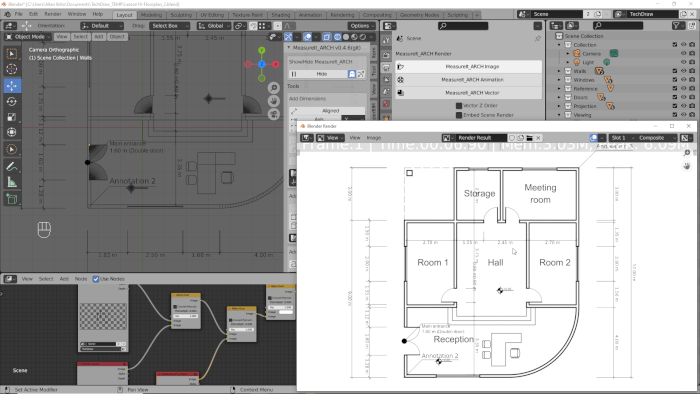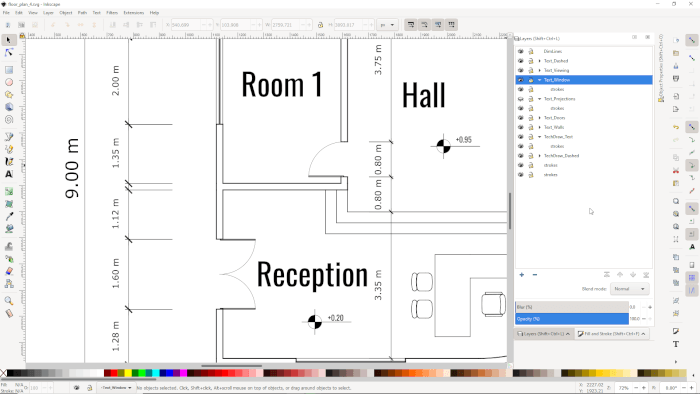Technical Drawing Creation With Blender And Inkscape (Workshop)
When you first think about Blender for architecture, you might imagine realistic renders created with Cycles and state of the art visualizations for interiors. But, do you know that it can do a lot more? We can use Blender as a replacement for a CAD software and draw great looking technical drawings.
By using Blenders incredible precision modeling tools, it is possible to draw any type of technical drawing with everything you need. You can add dimension lines, furniture, and architectural symbols.
In this workshop, you will learn how to use Blender and Inkscape to create technical drawings in a full open-source workflow. The workshop starts from a reference image, and from there we draw everything from scratch.

Do you need to know Blender? Absolutely not! The first lesson of this workshop gives a quick introduction to Blender for artists with no previous experience with the software.
By the end of this workshop, you will know how to produce a technical drawing to save as an image file (PNG) or a vector format (SVG). For the vector format, we will export the drawing from Blender and finish the process in Inkscape.

Here is a list of what you will learn:
- Blender UI basics
- How to render lines for technical drawing
- Use collections
- Compose scenes with view layers
- Filter drawing elements for rendering
- Organize a scene with Line Sets and Styles
- Draw architectural elements like walls, doors, and windows
- Add and edit dimension lines (Metric and imperial units)
- Include text labels
- Work with architectural symbols
- Import CAD files to Blender (DXF and DWG)
- Use CAD blocks to add furniture to a technical drawing
- Render the project as an image (PNG)
- Export the drawing as a vector (SVG)
- Edit and fix SVG problems in Inkscape
- Add new drawing elements in Inkscape
- Set a page layout in Inkscape to export as a PDF
Workshop content
The workshop has a total of 52 videos that you can either download or stream. Here is a list with all the available videos and lessons:
Lesson 01
- The Blender UI Basics (09:48)
- 3D Navigation shortcuts (06:09)
- Transformations and numeric input (04:53)
- Object creation and the 3D Cursor (03:36)
- Workmodes and Extrude (07:23)
- Applying materials rendering and saving files (06:21)
Lesson 02
- How to render lines for technical drawing (06:10)
- Preparing the background for rendering (03:51)
- Filtering lines with collections (05:21)
- Using the Mark Edge tool (03:15)
Lesson 03
- Introducing the floor plan drawing (02:14)
- Preparing Blender to draw a floor plan (05:16)
- Drawing the walls (16:42)
- Drawing curved walls (04:22)
- Editing doors and windows from the drawing (04:07)
- Drawing the stairs and exterior projection (08:28)
Lesson 04
- Drawing doors (06:41)
- Drawing windows (02:25)
- Drawing double doors (04:00)
- Preparing symbols to use in a library (07:44)
Lesson 05
- LineSets and Styles for doors (11:11)
- Making copies of doors (03:36)
- LineSets and Styles for windows (08:29)
- LineSets and Styles for stairs (03:34)
- Rendering dashed lines (05:41)
- Fixing rendering problems (03:53)
Lesson 06
- Adding text (06:19)
- Using view layers for text (05:07)
- Composing both view layers (05:00)
- Creating all text labels (02:48)
Lesson 07
- Installing the MeasureIt ARCH (04:21)
- Adding and rendering dimension lines (07:41)
- Dimension lines settings and Styles (18:25)
- Updating Style names (01:43)
- Adding more dimensions (05:47)
- Using anotations for drawings (04:01)
- Drawing dimension lines with no Addons (06:10)
Lesson 08
- Inserting CAD blocks (03:17)
- Converting DWG files to DXF (04:39)
- Importing DXF files to Blender (05:31)
- Editing furniture drawings (10:49)
Lesson 09
- Using architectural symbols (02:46)
- Drawing architectural symbols (06:25)
- Appending the symbol to a drawing (04:13)
- Rendering the symbol (02:52)
Lesson 10
- Rendering in SVG (10:40)
- Using Inkscape to edit SVG files (10:31)
- Editing dimension lines in Inkscape (10:47)
- Adjusting line thickness (11:46)
- Architectural symbols and text (07:12)
- Layers and page size for PDF exporting (04:33)


